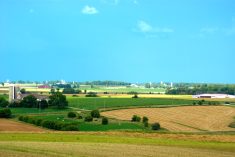I have no doubt that there’s a divide between rural and urban folks, and little doubt that the divide seems to be increasing. But I do take issue with people who try to generalize and simplify the reasons for it.
The fact that there is a rural-urban divide pains me greatly. I have people I greatly admire who live in cities. Some of the best people and greatest communities I know are in the country.
Despite what I might like to happen, I’ve come to acknowledge the rural-urban divide. However, it is not what many people in the cities profess it to be when they point to measures like employment and income and health care — which vary as widely among rural places as they do within cities.
Read Also

Packer buys Green Giant, Le Sieur veg brands from U.S. owner
A Quebec-based processor’s deal to buy the Green Giant and Le Sieur packaged and frozen vegetable brands in Canada from a U.S. owner clarifies the status of two popular retail brands grown by Canadian farmers.
The real divide is about respect and differences in what people value. The assumption is that rural people are jealous and angry because we don’t have what people in the cities do. Most of us, however, choose to live in the country because it gives us an affordable lifestyle, freedom, open air and great places to raise our children. People in the city don’t see it as such.
A recent column by Sean Spier of the McDonald-Laurier Institute, a think tank, published in the Toronto Star is an example of selective data interpretation and extrapolation to end conclusions that don’t necessarily make sense to those living day to day in rural areas.
I agree with Spier that the fact that a third of Canadians live in one of Toronto, Vancouver or Montreal has created a serious imbalance in the power accrued to those areas in politics and the economy.
Just look at the fixation with Toronto-centric issues in the current Doug Ford government, even though the government didn’t win all that many seats in the downtown. From reducing council size, to uploading subways, there’s a focus on Toronto because of Ford’s background as a Toronto city councillor and the sheer size and economic influence of the country’s largest city.
Before I get calls, I’ll acknowledge that the rural community feels more listened-to than it has in years by this government. The focus, however, is on Toronto.
Spier lists many of the usually referenced areas where urban and rural differ, including incomes, employment levels, education, immigration, health and religion.
I like to throw these sorts of generalizations back to my urban friends.
Yes, incomes are often less in rural areas, but in many cases marginally less when you pay significantly less to live, especially when it comes to housing. Many people do just fine financially in rural Ontario.
Farm households 50 years ago earned half of the median income of households in the rest of the country, according to Statistics Canada.
As of the 2016 census, farm households made 17 per cent more than the median household in Canada. That’s an indicator of serious economic progress in rural Canada.
Employment is also another strange argument. When one looks at rates of unemployment, the lowest rates are often in rural areas. Yes, Guelph continues to post the lowest unemployment rate in the country, as an urban area. But not far off are Grey, Bruce and Huron Counties. If you want a job in rural Ontario, it isn’t difficult to find. We can debate whether that job is a career or well-enough paying, but there’s no doubt that employment options are plentiful in rural areas.
Yes some rural schools do poorly on standardized tests, but some do exceedingly well. It was well known that graduates from the rural high school I attended were looked on favourably by some universities because of the track record of its students.
Yes there are challenges in rural health care, especially when one is seriously ill or needs a surgical procedure. I personally avoid going to a city hospital unless it is absolutely necessary and much prefer to use my local Exeter hospital, or the larger Stratford hospital, than end up in the busy London hospitals for a minor treatment.
There’s little doubt that the growing rural-urban divide is real. It is manifested in values (shown in voting results) and a perception of lack of respect. While both sides, rural and urban, become entrenched in their values, a bridging of the divide is challenging.












